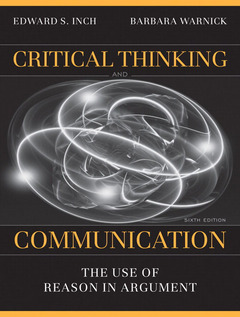Critical thinking and communication (6th ed )
Auteurs : INCH Edward S., WARNICK Barbara

Relating common theoretical models to true-to-life examples from law, ethics, education, and business, the authors stress the importance of argumentation in everyday life as they build reader competence and critical awareness.
Critical Thinking and Communication encourages readers to develop skills in both constructing and refuting arguments in a variety of contexts from informal conversations to structured debates. Through exercises and examples, readers learn how to create arguments, developed extended cases, and how to critically understand and interpret them. The Sixth Edition continues to help readers conceptualize argumentation in the larger framework of verbal and written communication, from public speaking and debating to interpersonal, intercultural, and small group communication.
Preface.
I. DEVELOPING A CONCEPTUAL FRAMEWORK FOR ARGUMENT.
1. Argument and Critical Thought.
Critical Thought.
Argumentation and Argument
Argument Contexts
2. Co-Orientational View of Argument.
Perspectives on Argumentation
How Argument Perspectives are Used
Arguer-Based Argument
Co-Orientational Approach
3. Argument Cultures and Ethics.
Culture and Argumentation
Ethics and Argumentation
Developing an Ethical Code
II. THE PARTS OF AN ARGUMENT.
4. Claims and Propositions.
Nature of Claims and Propositions.
Formulating a Proposition.
Classification of Claims.
5. Evidence.
Nature of Evidence.
Types of Evidence.
Evaluating Evidence.
Evaluating Statistical Evidence.
Presenting Evidence.
6. Reasoning.
Role of the Advocate
Formal Logic and Practical Reasoning.
Reasoning as Inference Making.
III.PRESENTING AND CRITICALLY EVALUATING ARGUMENTS.
7. Communicating Arguments.
Arguer as Communicator
Characteristics of Recipients
Communication Strategies, Techniques, and Principles
Using Language
8. Argument Analysis and Criticism
Benefits of Argument Analysis
An Approach for Analysis
Understanding Fallacies
IV. DEVELOPING AND ARGUING EXTENDED CASES
9. Case Construction and Arguing About Facts.
Arguing about Facts, Values, and Policies
Relating Facts, Values, and Polices
Issue Mapping
Principles of Case Construction
Principles of Refutation
Developing Fact-Based Cases
10. Arguing About Values.
Values and Value Systems
The Process of Value Change
Values and Argumentation
Stock Issues for Value Arguments
Issues Brief
11. Arguing About Polices.
The Future Nature of Policies
Policy Systems
Stock Issues in Policy Arguments
The Issues Brief
Alternative Formats for Arguing Policies
Alternative Formats for Refuting Policies
Appendix: Answers to Selected Exercises.
On-Line Appendices.
Intercollegiate Debate.
Research Strategies.
Date de parution : 03-2009
Ouvrage de 384 p.
17.8x23.5 cm



